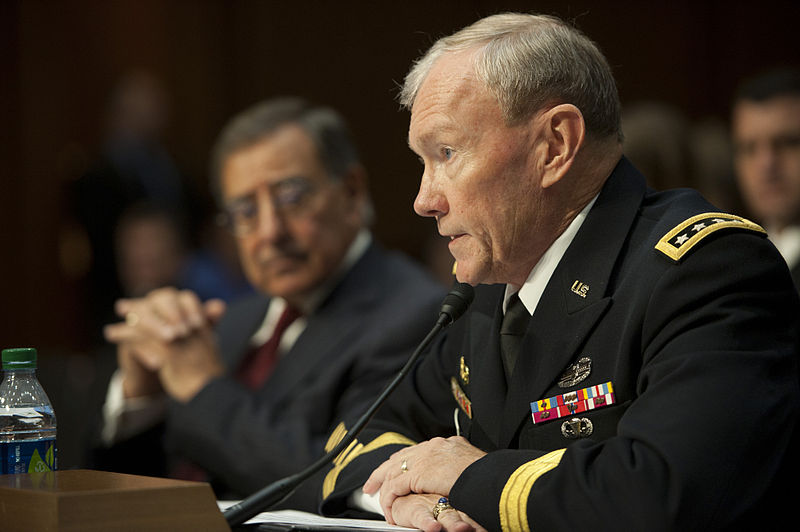Military Advice and Policy Decisions
Why "listen to the generals" is not good policy advice.
 The chairman of the Joint Chiefs of Staff, General Martin Dempsey, appropriately expressed umbrage the other day over a political refrain that is commonly heard, most recently and especially from Republican presidential candidates. That refrain—“listen to the generals”—is “offensive,” says Dempsey. “And here's why,” the general explained:
The chairman of the Joint Chiefs of Staff, General Martin Dempsey, appropriately expressed umbrage the other day over a political refrain that is commonly heard, most recently and especially from Republican presidential candidates. That refrain—“listen to the generals”—is “offensive,” says Dempsey. “And here's why,” the general explained:
One of the things that makes us as a military profession in a democracy is civilian rule. Our civilian leaders are under no obligation to accept our advice; and that's what it is. Its advice. It's military judgments, it's alternatives, it's options. And at the end of the day, our system is built on the fact that it will be our civilian leaders who make that decision and I don't find that in any way to challenge my manhood, nor my position. In fact, if it were the opposite, I think we should all be concerned.
There are really two basic reasons why “listen to the generals” is not good policy advice. One is what Dempsey appears to be talking about, which is that the president—the civilian commander in chief—has the final responsibility for deciding on the use of military force. It is the president who ultimately gets credit for military deployments that work out well and takes the heat for ones that don't. The president must exercise his or her own judgment on such an important matter even if it means overruling advice from below, whether it is coming from military or civilian advisers.
The other reason is that major decisions involving military force ought to be based on several considerations in addition to questions that are matters of military judgment. Those other considerations include the availability of resources, the adequacy of public support, and other political and diplomatic consequences of a military operation. Military field commanders and service chiefs should not be expected to integrate all those other considerations. They should focus on their own missions and offer the best possible advice regarding what it takes to accomplish those missions. They need to realize, of course, that they usually are not going to get everything they want and that some of those other considerations may weigh at least as heavily as their particular missions, but it would be unreasonable to rely on the generals to do all the necessary weighing.
These considerations came into play in the last big policy review of U.S. policy toward Afghanistan, and they are highly likely to come into play again with future decisions on Afghanistan. The current U.S. military commander there, General John R. Allen, has been talking about possibly keeping American troops in Afghanistan past 2014. I expect this perspective may collide, come 2014, with some of those other considerations that are not primarily matters of military judgment. There is nothing wrong with such a collision. If General Allen understands his mission to be stabilization of Afghanistan and the continuation in power of the Afghan government of the day, he should provide his best advice as to what forces are needed to accomplish that mission. And if whoever is the U.S. president in 2014 determines that accomplishing that mission is not sufficiently critical to U.S. interests to warrant extending a U.S. military expedition that would have already gone on for thirteen years, he should overrule the general's advice.
Image: Chairman of the Joint Chiefs of Staff
